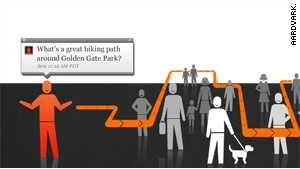🙂 (Mashable) — We’ve just confirmed with Google that the company has signed an agreement to acquire social search engine Aardvark.
Google isn’t disclosing the terms, but news of the acquisition was first reported by TechCrunch, who put the figure at around $50 million. Google told us that it’s “signed an agreement to acquire Aardvark but don’t have any additional details to report at this time.”
Aardvark is a relatively new startup from former Googlers that uses social distribution channels to get immediate answers to your questions.
As a user you can either ask or answer questions, and those questions and answers are funneled through friends and friends of friends via social channels, IM and e-mail with the purpose of turning your online network and reach into a easy way to get more qualified answers to your queries.
In some ways, Aardvark is very much like an alternative search engine that puts your social circle to work.
While we can only speculate as to what Google will do with Aardvark and its team at this point, here are few things that might make a service like Aardvark appeal to the likes of Google:
- Better search results: Earlier this year Google introduced answer highlights in search results in an attempt to actually answer your queries. From this endeavor we know that Google is interested in better understanding how to actually answer your queries, instead of just returning a list of links.
Google could potentially use the database of Aardvark questions and answers to help them fine tune its algorithms and improve this experience, or even integrate Aardvark answers into results pages. - Social context: Google Social Search attempts to provide context to your queries by returning matching content from your social network. Aardvark is somewhat of an extension of this idea, and could easily factor into and improve the social search experiment.
- Insight behind the question and answer chain: Aardvark has tons of interesting data on what searchers want to know, and how or why people choose to answer a particular query.
Aardvark also has proof of concept that distributed social queries are effective means to getting fast answers to user questions.
This data could help Google better understand what motivates certain queries and/or prompts quick responses. It’s certainly not a stretch of the imagination to guess that Google could even add Aarvark-like functionality to search, so that while you search you can query your friends as well.
 Omid Farhang
Omid Farhang

